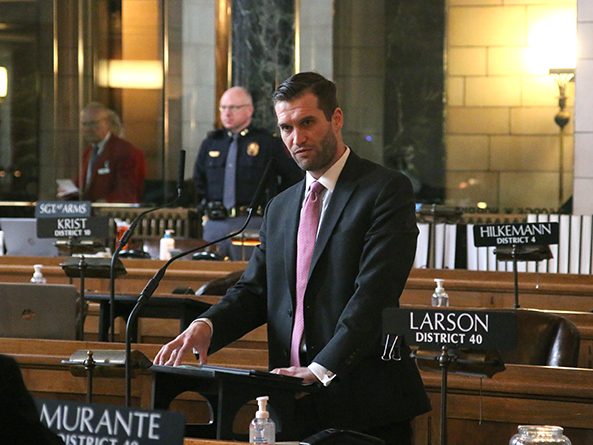Proposed keno changes stall
Lawmakers voted Feb. 24 to indefinitely postpone a bill that would make several changes to keno operations in Nebraska.

LB470, introduced by O’Neill Sen. Tyson Larson, would allow the use of an electronic keno ticket, beginning Jan. 1, 2018. Current law requires a paper ticket.
Under the bill, a paper ticket still would be available on request. A lottery operator that chooses to use electronic tickets would be required to take “reasonable measures” to prevent an individual outside of the licensed premises from participating — which could include geofencing to block access.
Larson said electronic tickets most likely would take the form of a phone app that would require a player to be “geofenced” into the keno location in order to play.
The bill also would reduce from five to four minutes the time required between keno games and permit the use of debit cards as a cash equivalent for wagers. The bill would not authorize the use of credit cards.
Larson said the inclusion of debit cards simply would update the state’s keno rules to acknowledge the way modern transactions occur. In addition, he said, the changes likely would increase keno revenue by approximately $500,000 annually.
“We hear a lot about a $900 million shortfall and looking for any funds that we can get,” he said. “Keno funds are the ones that help build parks — that help maintain a lot of good things that counties and cities do — and without it, property taxes will rise even further.”
Bellevue Sen. Carol Blood supported the bill. Bellevue has used keno funds for a variety of services, she said, including police and fire department enhancements, a nonprofit that assists abused women and children and new dental services for low-income residents.
“Keno dollars do good things for our communities – good things that communities couldn’t afford to do otherwise,” Blood said.
Sen. Ernie Chamber of Omaha offered a motion to indefinitely postpone LB470, saying the state should not authorize changes that would increase the addictive potential of keno. Speed of play and ease of payment are important factors in gambling addiction, he said.
In addition, Chambers said, the bill would not save the state money because it fails to include funding for additional state oversight of the keno industry.
“To say that this bill should be passed as a component of property tax relief is beyond the pale,” he said.
Sen. Lydia Brasch of Bancroft supported the Chambers motion. LB470 would not provide meaningful property tax relief, she said, because it does not address how agricultural land is valued. Instead, she said, the bill only would benefit keno operators.
“The house is designed to win,” Brasch said. “It always has been; it always will be.”
Elkhorn Sen. Lou Ann Linehan also supported the motion. Property taxes have not decreased in the years since keno gaming was first authorized, she said, and there is no reason to believe that LB470 would change that.
“I don’t buy that [keno] has brought us any tax relief,” Linehan said.
The motion to indefinitely postpone LB470 was adopted 24-9, ending consideration of the bill for the session. A majority of those voting was required.


